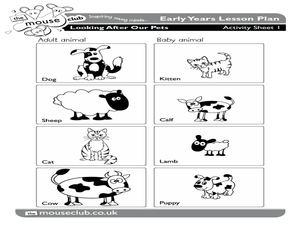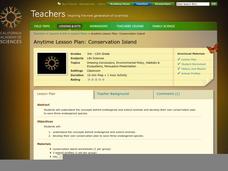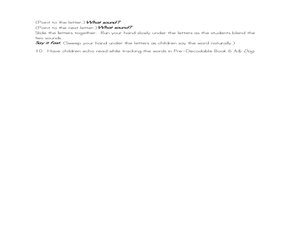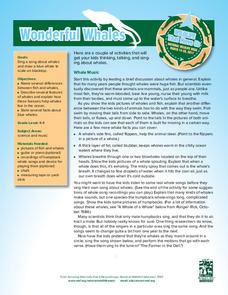Curated OER
How Many Penguins Does It Take? Studying Carrying Capacity and Limiting Factors
How does a population's habitat determine the size of that population? Teach learners about carrying capacity and limiting factors with an engaging roleplay activity. Class members pose as a colony of penguins who must gather food amidst...
Curated OER
A Home for a Cricket
First graders build a habitat for crickets after studying animal survival needs. They care for and observe the crickets in the classroom habitat.
Curated OER
TAKING APART OWL PELLETS
Students dissect and owl pellet and then reconstruct small rodents on a presentation board using a textbook picture as a guide.
Curated OER
Do As I Do
Lead your class in practicing gross motor body movements. Put on some background music and lead them through hops, skips, jumps, leaps, and running in place. Think of animal movements and have them move like an elephant or slither like a...
Curated OER
Prairie Plant Investigation
Young scholars carefully observe prairie plants and record their observations in a science journal. They examine the root systems of grasses and flowers and surmise how these plants can grow together on the prairie.
Curated OER
Looking After Our Pets
Students explore animal lifestyles by illustrating images. In this pet care lesson, students discuss their own pets and the conditions animals need to survive in both nature or a home. Students draw snakes and complete an activity sheet...
Curated OER
Oil Spill Experiment
Students participate in a hands-on experiment to help them explain the difficulties involved in oil spill cleanups.
Curated OER
Got the Whole World in My Hands
Students review factors that threaten survival of different species. this lesson is part of a multi-segmented unit on animal survival.
California Academy of Science
Conservation Island
Why not walk in the footsteps of Teddy Roosevelt and become a conservationist? After discussing issues and reasons for animal extinction, the class creates their own conservation plans. Each small group is given mock data regarding a...
Curated OER
Hand Washing
Mostly discussion, this lesson explores the importance and methods of hand washing. A few true stories of community illnesses spread by the neglect of washing hands serve as an anticipatory set. The activity is most memorable if you are...
Mathematics Vision Project
Module 6: Congruence, Construction, and Proof
Trace the links between a variety of math concepts in this far-reaching unit. Ideas that seem very different on the outset (like the distance formula and rigid transformations) come together in very natural and logical ways. This...
Curated OER
Introduce Vocabulary: From Tadpole to Frog (Pfeffer)
Take an amphibious journey with budding readers as you explore vocabulary in Wendy Pfeffer's informative book From Tadpole to Frog. This text is the backdrop of a vocabulary exercise based on six words: fertilize,...
Curated OER
Introduce Vocabulary: How Do Dinosaurs Say Goodnight? (Yolen and Teague)
If you are reading Jane Yolen's fun story How Do Dinosaurs Say Goodnight?, use these strategies to enhance the experience for budding readers. What new words will they learn? Find detailed comprehension questions for these...
Curated OER
How to Tame a Field Trip to the Zoo
Keep your pupils focused on field trip learning objectives with before, during, and after activities.
Curated OER
Web of Life
Highlight the importance of each animal in an ecosystem by having scholars research different endangered species. Research is a lot more streamlined when learners are provided with a tool such as the graphic organizer attached here. How...
Curated OER
Animals and Humans
Students identify the functions of various body parts. They participate in the "Head, Shoulders, Knees, and Toes" song, draw a picture of themselves and other mammals, and create a traced outline of their body that they add features to....
Curated OER
Small Group: BL
Practice target sounds, especially the /a/ sound. The teacher first speaks and learners repeat words, discriminating between words with varying sounds after focusing on /a/. Letter cards are held up to show the symbolic representation of...
Curated OER
Being Shadowed
What causes a shadow to appear? Have kindergartners and first graders explore shadows with a fun science activity. After reading a short paragraph about light sources, they draw a shadow for a little girl based on the location of the...
Science 4 Inquiry
At the Top: A Bald Eagle's Diet
Bald eagles are opportunistic predators and eat fish as well as raccoons and other mammals. Pupils learn about bald eagle diets through a simple simulation and videos. They collect and analyze data to understand the adaptability of this...
Desert Discoveries
Sonoran Desert ABC's
Third graders make alphabet cards that depict the wide variety of life forms found in the Sonoran Desert. A terrific instructional activity that combines language arts, visual arts, and life science all into one wonderful package. Each...
Curated OER
Wonderful Whales
Primary marine biologists consider the largest living animals on Earth, the whales. Introduce them to general anatomy, unique adaptations, and behaviors. Teach them to sing a song that will help them remember some of these facts....
University of Arizona
Fusing Firecrackers with Narrative
Improve your youngsters' descriptive writing. They study an object and write about what they see as a warm-up, then they read an excerpt from Paul Guest's memoir, One More Theory about Happiness. The next part of the...
Curated OER
Beary Necessary Rules
Young pupils learn about classroom rules as they also practice active reading strategies and reading comprehension skills. This lesson begins with a thorough reading of the story Brown Bear, Brown Bear, What Do You See?. As the...
Curated OER
Surviving in Our Ecosystems
Third graders investigate the balance of ecosystems and how each species has different survival needs. They research on the internet using the site included. They then participate in activities/centers utilizing the facts they discovered.

























